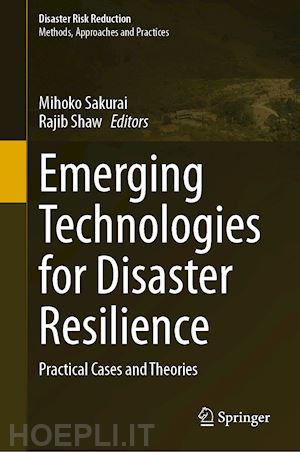
Questo prodotto usufruisce delle SPEDIZIONI GRATIS
selezionando l'opzione Corriere Veloce in fase di ordine.
Pagabile anche con Carta della cultura giovani e del merito, 18App Bonus Cultura e Carta del Docente
Technological advances have helped to enhance disaster resilience through better risk reduction, response, mitigation, rehabilitation and reconstruction. In former times, it was local and traditional knowledge that was mainly relied upon for disaster risk reduction. Much of this local knowledge is still valid in today’s world, even though possibly in different forms and contexts, and local knowledge remains a shared part of life within the communities. In contrast, with the advent of science and technology, scientists and engineers have become owners of advanced technologies, which have contributed significantly to reducing disaster risks across the globe.
This book analyses emerging technologies and their effects in enhancing disaster resilience. It also evaluates the gaps, challenges, capacities required and the way forward for future disaster management. A wide variety of technologies are addressed, focusing specifically on new technologies such as cyber physicalsystems, geotechnology, drone, and virtual reality (VR)/ augmented reality (AR). Other sets of emerging advanced technologies including an early warning system and a decision support system are also reported on. Moreover, the book provides a variety of discussions regarding information management, communication, and community resilience at the time of a disaster. This book’s coverage of different aspects of new technologies makes it a valuable resource for students, researchers, academics, policymakers, and development practitioners.Mihoko Sakurai is an associate professor at the International University of Japan, Center for Global Communications. Her academic background is in information systems and policy design. She has studied effective ways of using information communication technology in Japan's municipal governments. After the devastating Great East Japan Earthquake in 2011, she conducted field research and designed information systems to enhance the handling of future and unexpected disasters, especially for municipalities that have to deliver disaster relief to their residents. Her work related to the 2011 earthquake won the Best Paper Award at the International Telecommunication Union (ITU) Kaleidoscope Conference (2013) and the Hawaii International Conference on System Sciences (HICSS) (2016). Currently she is organising a research project discussing ICT use, disaster management and resilience with Japanese local councils and private enterprises. Her work has been published in the International Journal of Disaster Risk Reduction, European Journal of Information Systems, IEEE Communications Magazine, International Journal of Information Systems for Crisis Response and Management, Communications of the Association for Information Systems, Sustainable Cities and Society and in the proceedings of the leading international conferences.
Rajib Shaw is a professor in the Graduate School of Media and Governance of Keio University, Japan. He is also a senior fellow of the Institute of Global Environmental Strategies (IGES) Japan, and the chairperson of the Sustainable Environment and Ecological Development Society (SEEDS) Asia and the Church World Service (CWS) Japan, two Japanese NGOs. He is the co-founder of a Delhi-based social entrepreneur startup, Resilience Innovation Knowledge Academy (RIKA). Earlier, he was the executive director of Integrated Research on Disaster Risk (IRDR) and was a professor at Kyoto University. His expertise includes disaster governance, community-based disaster risk management, climate change adaptation, urban risk management, and disaster and environmental education. Professor Shaw is the chair of the United Nations Science Technology Advisory Group (STAG) for disaster risk reduction and the co-chair of the Asia Science Technology Academic Advisory Group (ASTAAG). He is also the coordinating lead author for the Asia chapter of IPCC’s 6th Assessment Report. He is the editor-in-chief of the Elsevier journal Progress in Disaster Science and the series editor of the Springer book series on disaster risk reduction. Prof. Shaw has published more than 45 books and over 300 academic papers and book chapters.











Il sito utilizza cookie ed altri strumenti di tracciamento che raccolgono informazioni dal dispositivo dell’utente. Oltre ai cookie tecnici ed analitici aggregati, strettamente necessari per il funzionamento di questo sito web, previo consenso dell’utente possono essere installati cookie di profilazione e marketing e cookie dei social media. Cliccando su “Accetto tutti i cookie” saranno attivate tutte le categorie di cookie. Per accettare solo deterninate categorie di cookie, cliccare invece su “Impostazioni cookie”. Chiudendo il banner o continuando a navigare saranno installati solo cookie tecnici. Per maggiori dettagli, consultare la Cookie Policy.